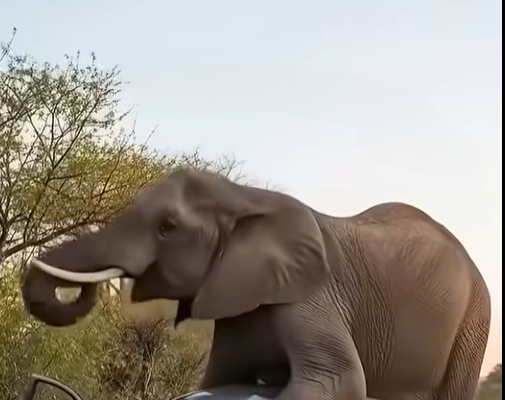
The African savanna has long been one of the most breathtaking landscapes on Earth. Stretching across multiple countries, it is a place where golden grasslands meet endless skies, where thorn trees cast small shadows on the dusty roads, and where the rhythm of life is set not by human hands but by the wild itself.
Visitors from around the world dream of safaris—long drives through nature reserves or national parks where giraffes bend their necks to feed, zebras graze in herds, lions rest lazily in the sun, and elephants, the giants of the plains, roam freely.
For many, the experience is magical: the thrill of seeing animals in their natural habitat, the silence of the savanna broken only by birdsong or distant calls of the wild, and the humbling reminder that these lands belong first and foremost to nature.
But sometimes, the magic turns into a lesson of respect—an encounter that etches itself permanently into memory. One such moment occurred when a safari group came face-to-face with one of the most powerful creatures on the planet: a bull elephant.
The Calm Before the Encounter
It began as an ordinary afternoon safari. The Toyota minivan rolled steadily along the narrow tarmac road, its tires crunching against patches of loose gravel. Inside, tourists leaned against the windows, their cameras clicking as they captured glimpses of giraffes stretching for the highest leaves, impalas darting gracefully across the grass, and flocks of birds rising in unison against the pale-blue sky.
The air was cool, the breeze carrying scents of dust and sun-warmed earth mixed with faint traces of animal musk. Every detail spoke of the wilderness, reminding the passengers that they were visitors in a world untouched by concrete and steel.
Children pointed excitedly at shapes in the distance, while adults whispered softly so as not to disturb the quiet. Some hoped to see a pride of lions. Others wished for a rhino or a herd of elephants. Few could have imagined that before the drive was over, they would be pressed into silence by the overwhelming presence of a single bull elephant.
The Sudden Appearance
From the dense thickets to the left, there was movement—subtle at first, almost like the shifting of leaves in the wind. But then, the brush parted, and out stepped a figure so immense that it seemed to block the sun.
A male elephant, easily recognizable by his towering size and wide head, emerged from the undergrowth. His ears spread wide, creating an intimidating silhouette. Dust clung to his wrinkled skin, and his trunk moved with slow, deliberate gestures.
For a moment, the world seemed to hold its breath. The passengers inside the van exchanged nervous glances. An excited murmur quickly died down when they noticed his body language. This was not the gentle approach of an elephant grazing near the roadside. This was the entrance of a dominant bull, a creature that demanded space.
Understanding the Behavior
Elephants are known for their intelligence and social bonds, but they are also fiercely protective of their territories. A bull in particular can display signs of heightened aggression if he is in musth, a natural condition characterized by increased testosterone levels. During this time, bulls are more restless, unpredictable, and prone to asserting dominance.
Whether this bull was in musth or simply felt his space was being invaded, his behavior left no doubt: the vehicle had entered into his path, and he intended to make that clear.
A Moment of Tension
The driver slowed immediately, instinctively aware of the danger. Everyone inside the van went quiet. The only sounds were the soft creaks of the vehicle and the faint rustle of grass as the elephant moved closer.
With astonishing speed for his size, the bull closed the gap between himself and the van. His trunk reached forward and rested heavily on the hood of the vehicle. The sheer weight made the metal groan. Passengers stiffened, clutching their seats, cameras forgotten.
Then came the sound of power. The elephant leaned his weight onto the car, testing it as if reminding the humans of how fragile their machine was compared to his strength. The windshield cracked in spiderweb patterns, tiny shards glittering in the fading sunlight.
Inside, panic took hold in silence. A man ducked low, shielding his head, while another passenger gripped the door handle tightly. Every second stretched longer than the last. The vehicle’s roof bent under the enormous pressure, a chilling reminder that no human-made object was a match for nature’s giant.
The Elephant’s Message
As the bull pressed his trunk and tusks against the frame, he swung his head slowly from side to side. His tusks scraped the metal with a sound that sent shivers down spines. Dust rose with each step of his massive feet.
It was as though the elephant was sending a message: This land is mine. Respect it.
For the passengers, the message was received loud and clear. They sat frozen, hearts racing, barely daring to breathe. One wrong move could have escalated the situation.
Release and Relief
And then, as suddenly as the confrontation had begun, it was over.
The elephant released the vehicle, stepped back, and folded his ears into a calmer position. With the same commanding presence with which he had appeared, he turned toward the tall grass. His colossal form swayed rhythmically as he walked away, each step steady, deliberate, and final.
The savanna swallowed him once again, leaving only silence in his wake.
Inside the van, the passengers exhaled collectively. Some laughed nervously, others wiped tears from their eyes. The driver checked the damage—caved roof, shattered glass, bent frame—but everyone was safe. That was all that mattered.
Reflections on the Encounter
What had begun as a peaceful safari turned into a lesson none would forget. The group had sought adventure, hoping for photos to take home, but instead, they gained something more profound: a reminder that in the wild, humans are not in control.
We may drive vehicles, build roads, and carry cameras, but in places like the savanna, true authority belongs to the creatures that have roamed these lands for millennia. The elephant’s show of strength was not cruelty—it was survival, instinct, and dominance in its purest form.
Lessons from the Wild
- Respect the Space of Wildlife
Safaris often bring humans closer to animals than they might ever imagine. But proximity should never be mistaken for control. Animals need space, and respecting boundaries is crucial to safety—for both humans and wildlife. - Understand Animal Behavior
Guides and drivers are trained to read the signals of animals. Flaring ears, trumpeting calls, and sudden charges are all ways elephants communicate. Understanding these behaviors can mean the difference between a safe sighting and a dangerous encounter. - Nature’s Reminder of Balance
Encounters like this highlight the importance of conservation. Protecting habitats ensures that elephants and other species continue to thrive, while also giving humans the opportunity to witness them in their natural splendor.
Why the Elephant Matters
Elephants are more than just impressive creatures. They are keystone species—meaning their presence and behavior shape the environment around them. By clearing trees, dispersing seeds, and creating water holes, elephants influence the survival of countless other animals.
Their strength may seem intimidating, but it is also essential to the ecosystem. When humans encounter elephants, we are not just meeting a giant of flesh and bone—we are witnessing an architect of the wild.
The Lasting Memory
For the passengers of that safari, the story will be told again and again. Perhaps their photos won’t show lions or rhinos that day. Instead, their memories will carry the image of an elephant towering over their vehicle, reminding them that the wild is not a theme park, but a living, breathing world where humans are guests.
The road through the savanna stretched on after the bull disappeared, but it no longer seemed ordinary. Each birdcall, each rustle of grass carried new meaning. The group had not just seen nature—they had felt it.
And that, after all, is the true gift of a safari: the chance to be humbled by the wild, to stand in awe, and to walk away with a story that will be told for generations.


